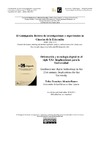Identificador persistente para citar o vincular este elemento:
https://accedacris.ulpgc.es/jspui/handle/10553/58449
| Campo DC | Valor | idioma |
|---|---|---|
| dc.contributor.author | Aleman Ramos, Pedro Francisco | en_US |
| dc.date.accessioned | 2019-12-16T15:15:06Z | - |
| dc.date.available | 2019-12-16T15:15:06Z | - |
| dc.date.issued | 2018 | en_US |
| dc.identifier.issn | 0213-0610 | en_US |
| dc.identifier.other | Dialnet | - |
| dc.identifier.uri | https://accedacris.ulpgc.es/handle/10553/58449 | - |
| dc.description.abstract | El objetivo del artículo es proponer un modelo de integración de la tecnología digital y la orientación en el ámbito de la educación. Para este fin, se relaciona los Entornos Personales de Aprendizaje (PLE) y la Activación del Desarrollo Vocacional y Personal (ADVP). Este modelo de innovación educativa en el ámbito universitario permitiría dar respuesta a los retos sociales y del Espacio de Educación Superior (EEES) a través de la adquisición de competencias para el desarrollo personal auto-dirigido. | en_US |
| dc.description.abstract | The aim of the article is to propose a model of integration of digital technology and guidance in the field of education. For this purpose, it relates the Personal Learning Environments (PLE) and the Activation of Vocational and Personal Development (ADVP). he use of this model of educational innovation in the university environment would allow responding to social challenges and the Higher Education Area (EHEA) through the acquisition of competences for self-directed personal development. | en_US |
| dc.language | spa | en_US |
| dc.relation.ispartof | El Guiniguada | en_US |
| dc.source | El Guiniguada [ISSN 0213-0610], n. 27, p. 22-33 | en_US |
| dc.subject | 33 Ciencias tecnológicas | en_US |
| dc.subject.other | Innovación | en_US |
| dc.subject.other | Competencias | en_US |
| dc.subject.other | Universidad | en_US |
| dc.subject.other | Orientación | en_US |
| dc.subject.other | Tecnología digital | en_US |
| dc.subject.other | Innovation | en_US |
| dc.subject.other | Competences | en_US |
| dc.subject.other | University | en_US |
| dc.subject.other | Orientation | en_US |
| dc.subject.other | Digital technology | en_US |
| dc.title | Orientación y tecnología digital en el siglo XXI: implicaciones para la Universidad | en_US |
| dc.type | info:eu-repo/semantics/article | en_US |
| dc.type | Article | en_US |
| dc.identifier.url | http://dialnet.unirioja.es/servlet/articulo?codigo=6484669 | - |
| dc.description.lastpage | 33 | en_US |
| dc.identifier.issue | 27 | - |
| dc.description.firstpage | 22 | en_US |
| dc.investigacion | Artes y Humanidades | en_US |
| dc.type2 | Artículo | en_US |
| dc.contributor.authordialnetid | 4389971 | - |
| dc.identifier.dialnet | 6484669ARTREV | - |
| dc.utils.revision | Sí | en_US |
| dc.identifier.ulpgc | Sí | en_US |
| dc.contributor.buulpgc | BU-EGB | en_US |
| dc.description.sellofecyt | Sello FECYT | |
| dc.description.esci | ESCI | |
| dc.description.dialnetimpact | 0,0 | |
| dc.description.dialnetq | Q4 | |
| dc.description.erihplus | ERIH PLUS | |
| item.grantfulltext | open | - |
| item.fulltext | Con texto completo | - |
| crisitem.author.dept | GIR Sociedad Digital | - |
| crisitem.author.dept | Departamento de Psicología, Sociología y Trabajo Social | - |
| crisitem.author.orcid | 0000-0002-9755-9171 | - |
| crisitem.author.parentorg | Departamento de Psicología, Sociología y Trabajo Social | - |
| crisitem.author.fullName | Alemán Ramos, Pedro Francisco | - |
| Colección: | Artículos | |
Visitas
105
actualizado el 06-jul-2024
Descargas
59
actualizado el 06-jul-2024
Google ScholarTM
Verifica
Comparte
Exporta metadatos
Los elementos en ULPGC accedaCRIS están protegidos por derechos de autor con todos los derechos reservados, a menos que se indique lo contrario.
